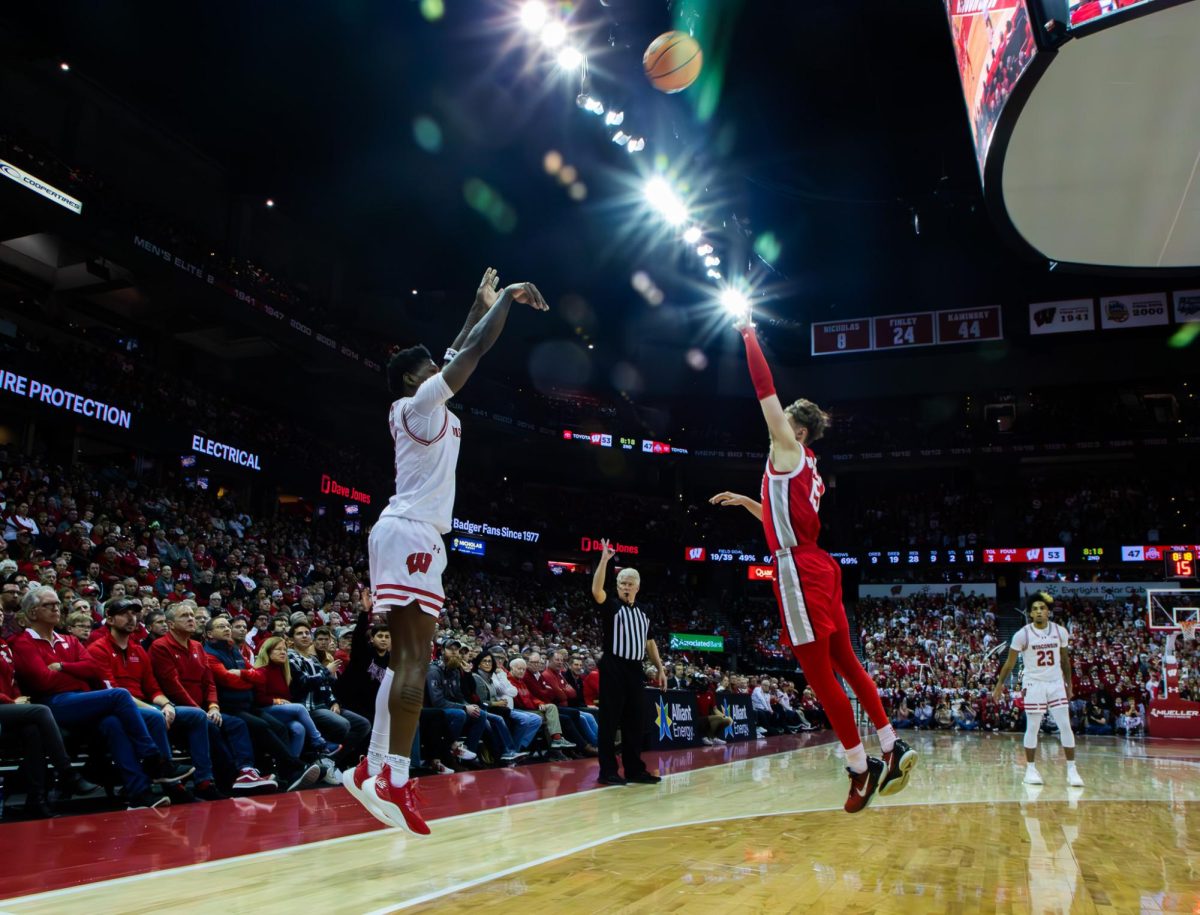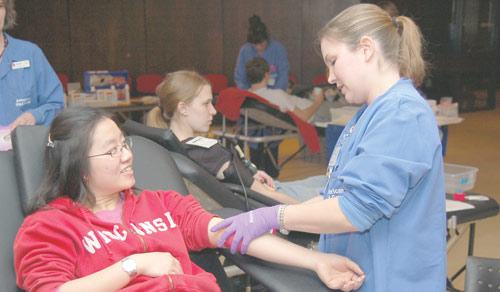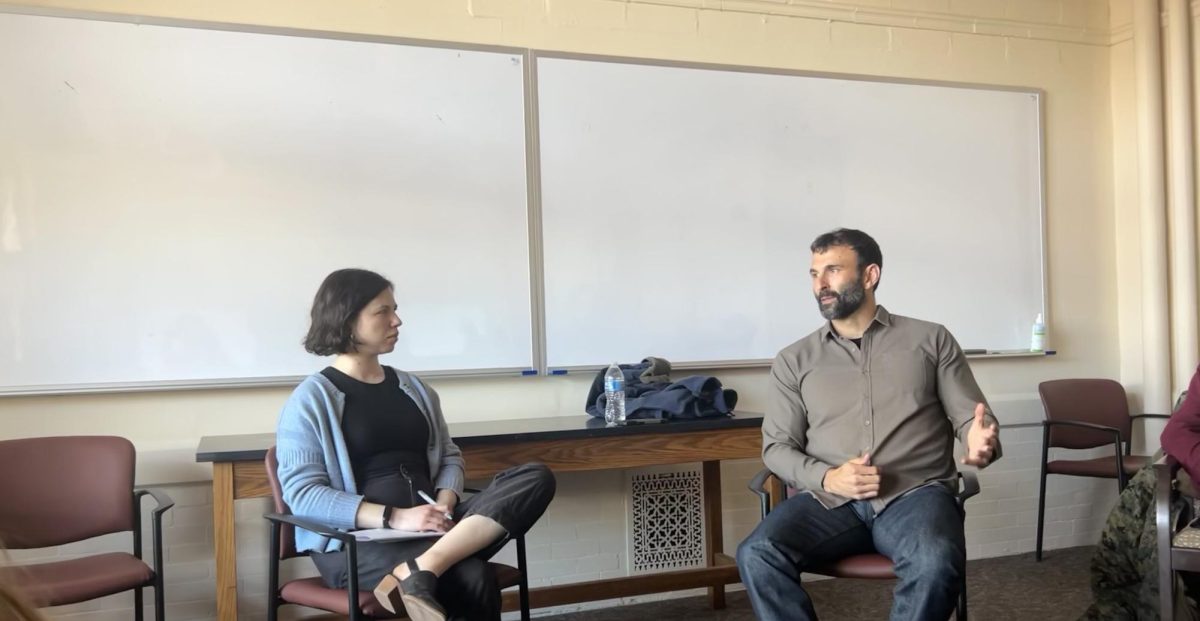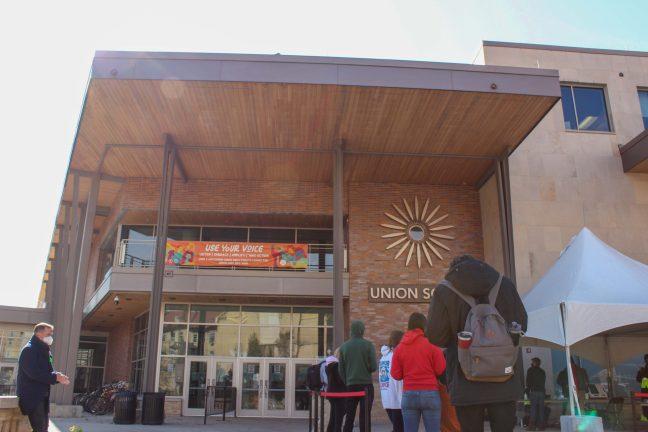University of Wisconsin students and the Red Cross partnered for a campus blood drive to help the COVID-19 convalescent plasma program in Madison and others across the country.
The Badgers Give Back Blood Drive took place Oct. 27-29 at the Nicholas Recreation Center.
According to the UW Health website, students who recently recovered from COVID-19 were especially encouraged to donate, but all students able to give blood could donate.
Data from small clinical trials and a national access program suggest convalescent plasma may lessen the severity or shorten the duration of COVID-19, according to the Mayo Clinic. The U.S. Food and Drug Administration issued an emergency use authorization of convalescent plasma in March.
Principal Investigator for the UW COVID-19 Convalescent Plasma Program William Hartman partnered with a UW sophomore in charge of the drive, Brody Andes.
Hartman is leading the UW and UW Health teams in partnership with 39 other research institutions, according to the UW Health website.
Andes said he was concerned about the reputation of the campus after a surge in on-campus cases in early September.
Wisconsin COVID-19 cases continue to rise amid calls for enforcement of mask policy
“The school was on the news in such a negative way,” Andes said. “I wondered what I could do to help out, and I made the connection with some interesting research I had read about in a news article.”
Hartman said the donations at the Badgers Give Back Blood Drive were whole blood donations tested for antibodies after a student donated.
According to the Red Cross website, a whole blood donation is the most flexible type of donation, because it can be transfused in its original form. Whole blood donations can be used to help multiple people when separated into its specific components of red cells, plasma and platelets.
Plasma is collected through an automated process which separates plasma from other blood components, then safely and comfortably returns red blood cells and platelets back to the individual using an ALYX machine.
Hartman said there are only four ALYX machines in the City of Madison, so they do not have the capacity for as many donors.
“By doing this as a blood drive and being able to extract the plasma from whole blood like they are doing at the Nick, you can get a lot more plasma from a lot more donors,” Hartman said.
The Badgers Give Back Blood Drive took place when the school typically holds the Homecoming Blood Drive.
Hartman said homecoming festivities canceled due to COVID-19 did not deter the blood drive coordinators.
“Because they already had the infrastructure in place and had the dates set, we just repurposed what was going to be the Homecoming Blood Drive into a convalescent plasma blood drive,” Hartman said.
The operational lead for convalescent plasma for Operation Warp Speed Colonel Sean O’Neil said in an email there are local coordinators in over 30 major cities across the nation reaching out to university systems, Greek life and ROTC units, encouraging them to partner locally with blood centers for these types of drives.
“I’m thrilled to see that UW students took this initiative to repurpose their homecoming activities,” O’Neil said in the email.
‘Nightmare scenario:’ Wisconsin health officials deem crisis as cases continue to climb
As of Nov. 3, there were 2,730 convalescent plasma sites in the U.S., according to the Mayo Clinic convalescent plasma website.
Andes said Michigan State University, the University of Michigan and the University of Notre Dame are all interested in conducting similar studies and want to have a student recruited campaign for a blood drive.
“Hopefully this catches on,” Andes said. “The Red Cross is everywhere, and wherever you have a big university, you have a lot of potential donors, because a lot of young people are contracting the virus.”
Currently, there is no vaccine for COVID-19. Remdesivir is the first and only drug to gain approval from the FDA for the treatment of COVID-19. Other non-FDA approved potential treatments of COVID-19 include Favipiravir, Molnupiravir, Recombinant ACE-2, Ivermectin and Oleandrin, according to The New York Times.
Mental health workers, students work to manage mental health during COVID-19 pandemic
Hartman said convalescent plasma can only be used as a treatment for COVID-19, not a vaccine.
“A vaccine produces active immunity because you are putting something in the body to make your body make its own antibodies,” Hartman said. “The convalescent plasma is called passive immunity.”
Passive immunity is provided when a person is given antibodies to a disease rather than producing them through their own immune system, according to the CDC.
According to the National COVID-19 Convalescent Plasma Project website, this treatment has been used for other viruses including Influenza, Ebola and other Coronaviruses.
“Our biggest goal is to definitively show that convalescent plasma will decrease mortality associated with hospitalized COVID patients,” Hartman said. “We hope to have a good idea as to how effective convalescent plasma really is by the end of this surge.”
Andes said his goal of reconstructing UW’s reputation through convalescent plasma research is successful.
Hartman said at least 435 students donated blood. Andes and Hartman both said they are very happy with the turnout.
“We’re turning a negative into a positive … or a positive into a positive,” Andes said.
















